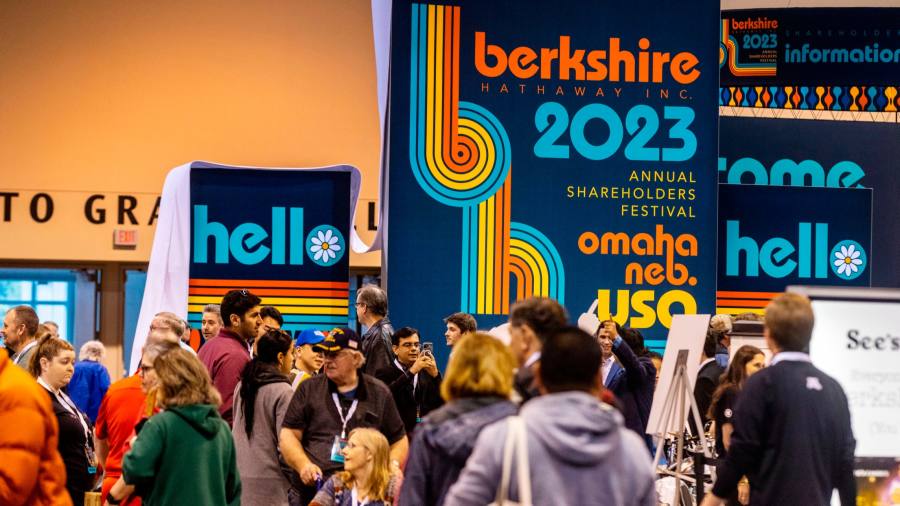Warren Buffett’s Berkshire Hathaway sold billions of dollars worth of stock and invested little money in the US equity market in the first three months of the year, a signal the famed investor saw little appeal in a volatile market.
Berkshire disclosed on Saturday that it had sold shares worth $13.3bn in the first quarter and bought stocks for a fraction of that figure. Instead, it put $4.4bn towards repurchasing its own stock, as well as $2.9bn on the shares of other publicly traded businesses.
The figures underscore the struggle Berkshire faces in putting its mountain of cash to work at a time when Buffett and his longtime right-hand man Charlie Munger regard valuations as unappetising. The company’s cash pile has risen by $2bn since the start of this year to $130.6bn, its highest level since the end of 2021.
Munger last month told the Financial Times that investors should reduce their expectations for stock market returns as the Federal Reserve raises interest rates and the economy slows.
The pair were joined on stage in downtown Omaha by Gregory Abel and Ajit Jain, two Berkshire vice chairs, for the company’s much anticipated annual meeting.
Tens of thousands of shareholders descended on the Midwest city to hear from Buffett and the Berkshire team this weekend, where they discussed artificial intelligence and its effects on the investment world, their views on Tesla chief executive Elon Musk — Musk overestimated himself, Buffett said — as well as succession at the company.
Buffett was relatively sanguine about the prospects for the company he has led for the past 58 years, as well as the broader economy, which has powered through aggressive rate hikes from the Fed and a series of bank failures that have rattled confidence in the financial system.
He noted that the effects of the slowing economy were only just beginning to be felt by Berkshire, although he did not paint a dour picture of the economy. Buffett said he expected earnings to decline at the majority of its businesses this year.
“It isn’t that employment has fallen off a cliff or anything, but it is a different climate than it was six months ago,” he said. “A number of our managers were surprised. Some had too much inventory on order.”
Higher interest rates, however, have also been a boon to Berkshire. The company invests the vast majority of its $130.6bn of cash in short-term Treasury bills and bank deposits.
Income on those short-term bills and cash-like deposits surged to $1.1bn, up from $164mn a year prior.
Buffett was pressed for his thoughts on the health of the US banking system, which is in the midst of crisis, given the investor’s long tenure and history backstopping the industry.
The billionaire investor said Berkshire had grown more cautious about investing in the industry given the rapid deposit flight some banks have suffered.
It is a change from previous crises, when Berkshire’s capital helped shore up both Goldman Sachs and Bank of America. The latter is now a core holding in the company’s stock portfolio.
Buffett declined to say whether it was cutting its position in Activision Blizzard, which it bet heavily on after Microsoft agreed to buy the game-maker. Activision shares have tumbled since UK regulators moved to block the takeover, throwing the arbitrage trade made by Berkshire and a litany of hedge funds into turmoil.
Disclosures have shown that Berkshire increased its stake in Occidental Petroleum during the quarter, however Buffett on Saturday said the company was not planning to take control of the oil company.
Investors will have to wait until later in May to see how the company shifted its portfolio.
Berkshire reported a profit of $35.5bn in the first quarter, or $24,377 per class A share, largely driven by a rally in stocks that lifted the value of its $328bn portfolio of shares. Profit was up from $5.6bn a year before.
Operating earnings — Buffett’s preferred performance measure for Berkshire’s diverse group of businesses — rose 12.6 per cent from the year to $8.1bn. For the first time the figure includes the results of truck stop business Pilot Flying J, which Berkshire took majority control of in January.
One of Berkshire’s crown jewels, the Geico auto insurer, swung to an underwriting profit after six consecutive quarters of losses. The company said that scaling back advertising and raising policy rates had helped the unit generate a $703mn underwriting profit.
The impact of higher interest rates and slower economic growth was evident across the businesses, which span the Dairy Queen ice cream purveyor, aeroplane parts manufacturer Precision Castparts and the BNSF railroad.
Berkshire warned lower home sales continued to weigh on Clayton Homes, one of the largest makers of modular homes in the US, and that sales across its other housing businesses had fallen at the start of the year. Traffic on its BNSF railroad also fell at the start of the year, which the company blamed on lower imports from the west coast and the loss of a customer.
Buffett was also questioned over the significant role Apple plays in the Berkshire empire, with its stake in the iPhone maker valued at $151bn at the end of the first quarter — just under half the value of its entire stock portfolio.
“It just happens to be a better business than any we own,” he said. “Our railroad is a very good business but its not remotely as good as Apple’s business.”
The investor struck a fairly upbeat tone at the meeting, joking that the coronation of King Charles III was a “competing broadcast” on Saturday.
Berkshire stock has risen by 4.9 per cent since the start of the year.
Credit: Source link











